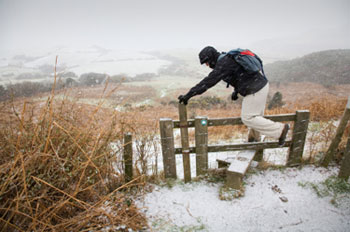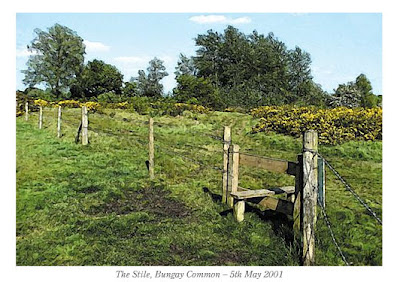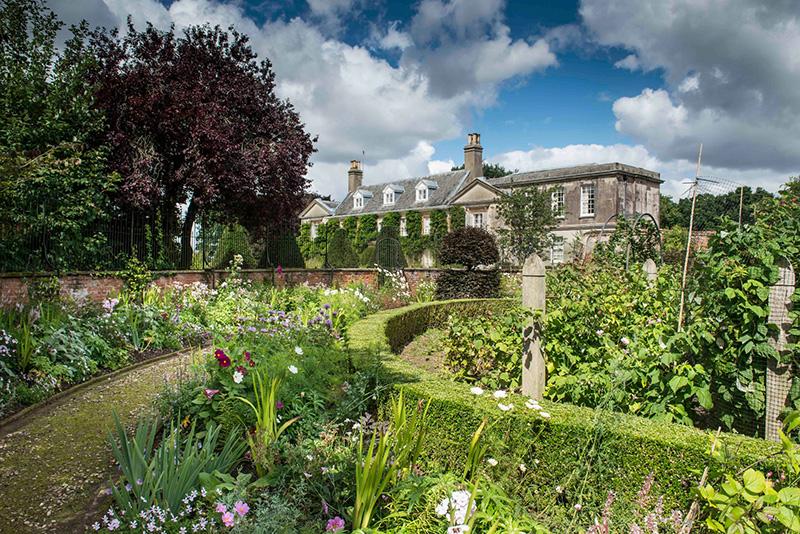 A Ban on Stiles and Kissing Gates?
A Ban on Stiles and Kissing Gates?
Like many youngsters who spent most of his childhood in the countryside, commentator John Sheard received his first ever kiss over an aptly named kissing gate. Now, he fears that such archetypal rural amenities, including the simple stile, could be at risk because of demands from the disabled lobby.
WE WERE both, I would guess, eight or nine years old but she, being a girl, had matured faster and stood a good six inches taller. So I had to stand on the lower rungs of the kissing gate to receive my first ever peck on the lips from my best friend’s blonde-haired sister Gilly Holloway.
That kissing gate is still there, on the pathway to a country church where the tombstones will soon be surrounded by a carpet of snowdrops. At the far side of the church, where a much rougher path leads down to the stream when we once caught bullheads in our hands, there was an ancient stile which I haven’t climbed since I was nobbut a lad.
I hope that’s still there too, for I can remember it crystal clear in my mind’s eye, but it survival could now be at risk thanks to yet another law of unintended consequences (LUC), in the 1995 Disability Discrimination Act.
This toughened up the already quite strict laws to allow disabled people, and particularly wheelchair users, better access to public buildings like libraries, catering establishments like pubs and hotels, and entertainment facilities like cinemas and theatres. As such, it was widely applauded by the majority of able people.
But like many other minority causes these days, the case was taken up by politically correct activists – many of them, I suspect, quite able of body but angry and bitter of mind – who decided that here was a big drum to beat in protest against authority in general and their worst enemies in particular: the ordinary, every day folk intent on going about their business with as little hurt to other people as possible.
This allegation, I know, will offend many people but I suffer from this almost every week on my way around Skipton. When the local millennium committee was deliberating on a suitable monument to mark the year 2,000 they recommended building a delicate, rather elegant footbridge over the canal basin.
You can walk on the canal towpath from Leeds to Liverpool with very few obstructions but, in the centre of Skipton, you have to leave it to make a confusing, twisting walk through the busy streets, before getting to the other side of the basin towards Skipton Castle.
The millennium project was supposed to bridge that gap, but it had to be abandoned because protestors demanded that the slim footbridge – rather similar in shape although much smaller than the famous Ha’penny Bridge over the River Liffey in Dublin – must provide wheelchair access, a proposition which made it financially impossible.
Now, the LUC buried in the disability laws has struck again for County Councillors in Suffolk have discovered that kissing gates and stiles on country footpaths are illegal – because they do not take wheelchairs.
 If this Government and the disability lobby decide to take up this lunacy, every rural council in the land could be forced to replace tens of thousands of these mini-monuments that have given access to the great outdoors for centuries. And what about the path surfaces themselves? Will they have to be concreted over to allow a nice smooth passage for wheelchairs?
If this Government and the disability lobby decide to take up this lunacy, every rural council in the land could be forced to replace tens of thousands of these mini-monuments that have given access to the great outdoors for centuries. And what about the path surfaces themselves? Will they have to be concreted over to allow a nice smooth passage for wheelchairs?
Now I have a genuine sympathy for the disabled but I feel this could be yet another case of one vocal minority overwhelming the rights and pleasures of a much larger majority, in this case country folk whose wishes have already been trampled into the mud for the past ten years.
I just hope the PC lobbyists have enough sense to realise that if they push this case, they risk a huge public backlash against the very people – the disabled – they claim to represent. And that also goes for the hundreds of MPs who have never stepped off concrete or tarmac in their entire urban lives. Let this LUC not pass!
Source: www.daelnet.co.uk








